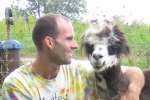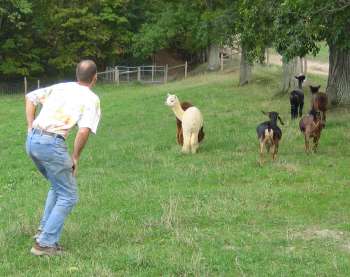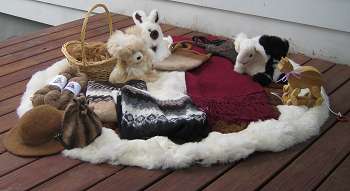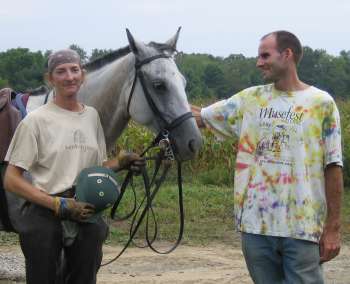- By Dan Veaner
- Business & Technology
 Print
Print  Chris Grant and Paco the Curious AlpacaWhile driving along Conlon Road you may be surprised to see alpacas looking back at you. If so you must have passed Indian Chimney Farm, a 65 acre farm that is the home of Chris and Kim Grant, alpaca, horses, goats, several chickens and Clyde the dog. The farm is an agritourism destination, open to the public for special event weekends in October, November and December.
Chris Grant and Paco the Curious AlpacaWhile driving along Conlon Road you may be surprised to see alpacas looking back at you. If so you must have passed Indian Chimney Farm, a 65 acre farm that is the home of Chris and Kim Grant, alpaca, horses, goats, several chickens and Clyde the dog. The farm is an agritourism destination, open to the public for special event weekends in October, November and December.Initially the Grants bought the farm to live on. Chris makes his living as an Internet consultant. His firm, Gorges Web Sites, specializes in Web design, application programming, and Information Technology (IT) support. The farm was Kim's vision. She is an Animal Sciences graduate of Cornell who grew up on a farm in Rochester. For now Chris earns the money that they turn around and put into the farm. "I like to tell people it's very tax advantaged."
However, he put together a business plan that should have the farm paying for itself within a five to eight year period. "We designed a break-even business. If we achieve that it will probably be the biggest achievement of my life, and that's saying a lot." The main ingredients of the plan are a blend of agritourism and the alpaca herd.

Alpaca are part of the llama family. They produce a fine wool that is used to make very soft and attractive yarn products, and look like they would be easily at home in a Dr. Seuss book. Chris says alpaca are "the world's finest livestock investment." They are fairly low maintenance, their wool pays for their upkeep, and he says, "They have tax deferred compounded growth of wealth."
The Grants started with three alpaca. Two years ago a female was born. Last year three more were born, all males. That was frustrating because the more females, the faster the herd can grow. Chris says they won't be able to get back their breeding fees if they sell the males. "It is extremely infrequent that a male is of herd sire quality. You want to breed your females to the best compatible male out there. Only in rare cases is it one of your own. So we hire studs."
This year a cria (baby alpaca) is due any day now and more are due next Spring. They are aiming for a herd of 20 or 30 animals, which will mean they can sell a few every year. They want to get the herd up to 12 to 15 alpaca before they begin selling them. Alpaca go for between $500 for a companion male and a quarter of a million dollars for a stud. The females are more expensive than the males except for top quality herd sires. They typically sell for between $10,000 and $30,000.
The Grants bought the farm in 2002. During their first season they learned about the New York State Agritourism and Education grant. They decided that including agritourism in their business plan was suited to their location and the beauty of the property. The weekend events are a part of this plan. Visitors will find food vendors, face painters, a wagon load of pumpkins and tours of the farm. And of course there will be a gift shop.
 Many of the gift shop's items are imported from Peru, but family and neighbors make some of them from the wool that comes from the Grants' alpaca herd |
For the future they are refinishing the space over the garage to turn it into a year-round gift shop. Chris will maintain his office in a corner and devote the rest of the space to the shop. He calculates that when the shop is completed it will be feasible to conduct tours on a more regular basis. "It's tricky, though. Most people want tourism in the summer, but nobody's going to buy wool clothes in the summer." That is why they scheduled this year's events on Fall weekends: October 8-9, November 25-26 and December 17-18.
The Grants are beginning to develop their own products made from their animals' wool, including hats and scarves. While they carry a number of less expensive alpaca items from Peru, they plan to offer more expensive items made from their own alpaca. The line will be called "Curious Alpaca." Chris says, ""Some people really like the product that they see when they can see the animal it came from." He also hopes to market these items via the Internet to target the New York City market.
The animals go through about 1000 bales of hay per year, which they purchased prior to this year. "This year we grew a good part of that." Rather than grow the crops themselves, the Grants enter into crop sharing agreements with neighboring farmers. The crop is grown on their farm with seed they buy, in return for which they get half the resulting hay.
For the future they are hoping to develop more farm tours, including tours for school groups. In fact the Grants are looking for somebody to develop their tour program. They are looking for a teacher, perhaps a substitute teacher or a retiree who can also work on planning and scheduling tours, activity preparations, and adapt curriculums.

Kim and Chris Grant
While the Grants have many interests, for now the focus is on the alpaca and developing tourism on the farm. And on the lifestyle.
----
v1i10
v1i10




